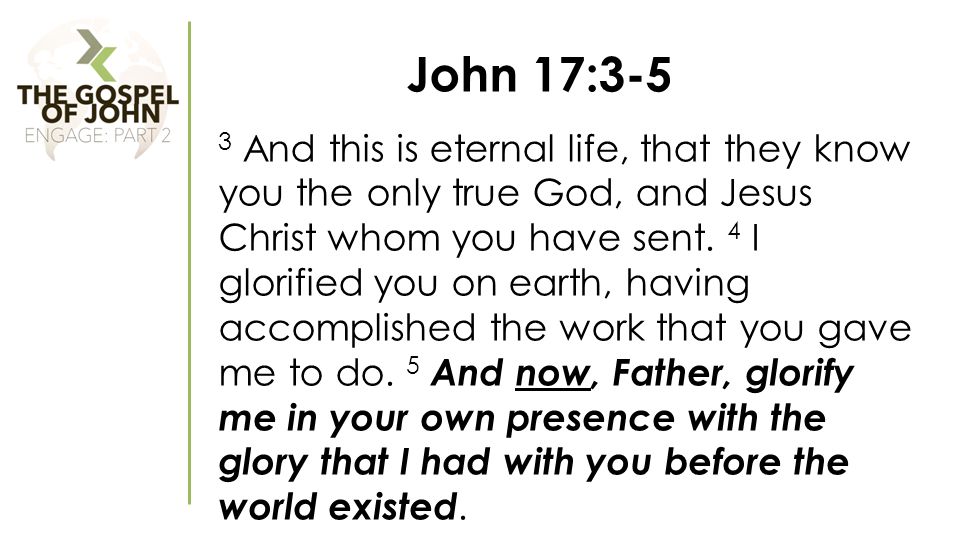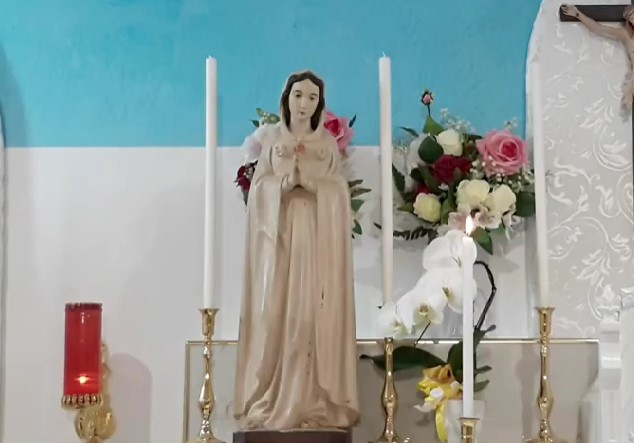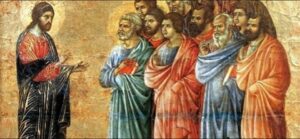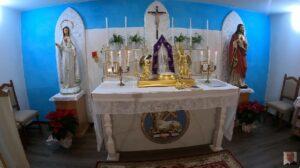
Now this is everlasting life, that they may know You, the only true God, and Him Whom You have sent, Jesus Christ. I have glorified You on earth.
ORARI S.MESSA DI MERCOLEDI 25 MAGGIO 2022, ORE 8.00 – In Vigilia Ascensionis ~ II. classis
Commemoratio: S. Gregorii VII Papæ Confessoris
S.MESSA ONLINE DI DON ENRICO RONCAGLIA, su youtube channel:
https://www.youtube.com/channel/UCYYDj4O4e11cE7XNtngkoJA e qui:
LITURGIA IN LATINO\ENGLISH:
https://divinumofficium.com/cgi-bin/missa/missa.pl
COMMUNIO PREGHIERE\PRAYERS:
https://www.proselitismodellascienza.it/2021/10/25/communio-e-comunione-spirituale/
EVANGELIUM E OMELIA\HOMILY:
Evangelium
Ioannes 17:1-11
In illo témpore: Sublevátis Iesus óculis in cœlum, dixit: Pater, venit hora, clarífica Fílium tuum, ut Fílius tuus claríficet te: sicut dedísti ei potestátem omnis carnis, ut omne, quod dedísti ei, det eis vitam ætérnam. Hæc est autem vita ætérna: ut cognóscant te, solum Deum verum, et quem misísti Iesum Christum. Ego te clarificávi super terram: opus consummávi, quod dedísti mihi, ut fáciam: et nunc clarífica me tu, Pater, apud temetípsum, claritáte, quam hábui, priúsquam mundus esset, apud te. Manifestávi nomen tuum homínibus, quos dedísti mihi de mundo. Tui erant, et mihi eos dedísti; et sermónem tuum servavérunt. Nunc cognovérunt, quia ómnia, quæ dedísti mihi, abs te sunt: quia verba, quæ dedísti mihi, dedi eis: et ipsi accepérunt, et cognovérunt vere, quia a te exivi, et credidérunt, quia tu me misísti. Ego pro eis rogo, non pro mundo rogo, sed pro his, quos dedísti mihi: quia tui sunt: et mea ómnia tua sunt, et tua mea sunt: et clarificátus sum in eis. Et iam non sum in mundo, et hi in mundo sunt, et ego ad te vénio.
Gospel
John 17:1-11.
At that time, raising His eyes to heaven, Jesus said, Father, the hour has come! Glorify Your Son, that Your Son may glorify You, even as You have given Him power over all flesh, in order that to all You have given Him He may give everlasting life. Now this is everlasting life, that they may know You, the only true God, and Him Whom You have sent, Jesus Christ. I have glorified You on earth; I have accomplished the work that You have given Me to do. And now You, Father, glorify Me with Yourself, with the glory that I had with You before the world existed. I have manifested Your name to the men whom You have given Me out of the world. They were Yours, and You have given them to Me, and they have kept Your word. Now they have learnt that whatever You have given Me is from You; because the words that You have given Me I have given to them. And they have received them, and have known of a truth that I came forth from You, and they have believed that You did send Me. I pray for them; not for the world do I pray, but for those whom You have given Me, because they are Yours; and all things that are Mine are Yours, and Yours are Mine; and I am glorified in them. And I am no longer in the world, but these are in the world, and I am coming to You.
DALL’OMELIA DI (FROM THE HOMILY BY) DON ENRICO RONCAGLIA – ORARI S.MESSA DI Mercoledi 25 MAGGIO 2022, ORE 8.00

DALL’OMELIA DI DON ENRICO RONCAGLIA (*,1)
Oggi ricordiamo S. Gregorio VII (+). Era un monaco dell’abbazia benedettina di Cluny in Francia. Promosse la riforma benedettina e di tutta la Chiesa.
Il potere laico dei principi era diventato infatti opprimente sulla Chiesa. Occorreva un’investitura civile per i vescovi, Cio’ dava luogo alla simonia della chiesa (acquisto delle cariche religiose).
Subi l’esilio da parte di Enrico IV. Ma e’ ricordato per la sua grande riforma.
Questo asservimento della Chiesa pero’ e’ ben presente anche al giorno d’oggi.
Abbiamo visto vescovi pronti ad obbedire allo stato ma non alla cura pastorale. Stanno servendo un potere mondano e non seguendo la loro missione.
Ma noi non siamo abbandonati!
La BVM ci guida, ci ispira e ci assiste, in attesa che la Chiesa rinasca tramite l’intervento della Corredentrice e Mediatrice di tutte le Grazie!
Bastera’ il soffio della bocca del signore per abbattere la falsa chiesa!
Restiamo, intanto, uniti alla Beata Vergine Maria e a Benedetto XVI!
Sia lodato Gesu’ Cristo! Sempre sia lodato!
____________________
(*) Questo commento e’ scritto in tempo reale durante l’omelia. Mi scuso per l’eventuale misinterpretazione delle parole di Don Enrico.
(1) La Cappella dei Sacri Cuori e’ d’ora in avanti sotto la protezione della Madonna Pellegrina di Montichiari (Brescia, 1946).
(+) San Gregorio VII, nato Ildebrando di Soana (Soana, 1015 circa[N 1] – Salerno, 25 maggio 1085), è stato il 157º papa della Chiesa cattolica dal 22 aprile 1073 alla sua morte. Inviato giovanissimo a studiare a Roma, entrò in contatto con i valori della riforma cluniacense e divenne consigliere papale, iniziando a esercitare una fortissima influenza, tanto che si è spesso arrivati a parlare di “riforma gregoriana” per indicare quella trasformazione in atto nella chiesa del tempo. Il 22 aprile 1073 venne eletto papa per acclamazione, senza seguire le norme canoniche previste, suscitando critiche riguardo alla legittimità che perdureranno per tutto il suo pontificato. Durante il suo pontificato, Gregorio VII si spese energicamente per combattere la simonia, il nicolaismo e, soprattutto, nell’affermare il primato papale sul potere laico. Probabilmente nel 1075, scrisse il celebre Dictatus papae, una serie di 27 affermazioni riguardanti diritti e prerogative che nelle sue intenzioni dovevano essere attribuite al papa. La sua ferma intenzione a sottrarre al potere laico il diritto di investitura lo condusse allo scontro con al re (e futuro imperatore) Enrico IV di Franconia, La lotta sfociò in eventi drammatici e inediti, con Enrico che arrivò a destituire Gregorio e quest’ultimo a rispondere scomunicandolo. Emblematica la cosiddetta “umiliazione di Canossa” con la quale il giovane imperatore intendeva chiedere il perdono del papa. La lotta si concluse negativamente per Gregorio che fu costretto nel 1080 a fuggire da Roma e a mettersi in salvo a Salerno grazie alla protezione del normanno Roberto il Guiscardo. Gregorio sarebbe morto in esilio nel 1085. Tuttavia la sua azione caparbia aveva oramai impattato profondamente sulla Chiesa e cambiato i rapporti di forza con il potere temporale. Considerato uno dei papi più importanti della storia, contribuì indiscutibilmente al formare l’assetto della Chiesa che, sostanzialmente, permane tutt’oggi .
FROM THE HOMILY BY DON ENRICO RONCAGLIA (**,2)
Today we remember St. Gregory VII (+). He was a monk of the Benedictine abbey of Cluny in France. He promoted the Benedictine reform and of the whole Church. The secular power of the princes had in fact become oppressive on the Church.
A civil investiture was needed for the bishops. This gave rise to the simony of the church (purchase of religious offices). I was exiled by Henry IV.
But he is remembered for his great reform. However, this enslavement of the Church is also very present today.
We have seen bishops ready to obey the state but not pastoral care. They are serving a worldly power and not following their mission. But we are not abandoned! The BVM guides us, inspires us and assists us, waiting for the Church to be reborn through the intervention of the Co-Redeemer and Mediatrix of all Graces!
The breath of the lord’s mouth will be enough to bring down the false church!
We remain, intent, united to the Beatat Virgin Mary and to Benedict XVI!
Praised be Jesus Christ. Always be praised!
___________________
(**) This comment is written in real time during the homily. I apologize for any misinterpretation of Don Enrico’s words
(2) The celebration Chapel of Sacred Hearts from now on is set under the protection of the Pilgrim Madonna of Montichiari (Brescia, Italy, 1946).
(+) Saint Gregory VII, born Ildebrando di Soana (Soana, about 1015 [N 1] – Salerno, May 25, 1085), was the 157th pope of the Catholic Church from April 22, 1073 to his death. Sent very young to study in Rome, he came into contact with the values of the Cluniac reform and became papal adviser, starting to exert a very strong influence, so much so that it has often come to speak of “Gregorian reform” to indicate the transformation taking place in the church of time. On 22 April 1073 he was elected pope by acclamation, without following the established canonical norms, arousing criticism regarding the legitimacy that will last throughout his pontificate. During his pontificate, Gregory VII spent energetically fighting simony, Nicolaism and, above all, in affirming the papal primacy over secular power. Probably in 1075, he wrote the famous Dictatus papae, a series of 27 affirmations concerning rights and prerogatives that in his intentions were to be attributed to the pope. His firm intention to steal the right of investiture from secular power led him to clash with the king (and future emperor) Henry IV of Franconia, The fight resulted in dramatic and unprecedented events, with Henry who came to dismiss Gregory and the latter to respond by excommunicating him. The so-called “humiliation of Canossa” with which the young emperor intended to ask the pope’s forgiveness is emblematic. The fight ended negatively for Gregory who was forced in 1080 to flee from Rome and to save himself in Salerno thanks to the protection of the Norman Roberto il Guiscardo. Gregory would have died in exile in 1085. However, his stubborn action had by now profoundly impacted the Church and changed the balance of power with the temporal power. Considered one of the most important popes in history, he indisputably contributed to shaping the structure of the Church which, essentially, still remains today.

